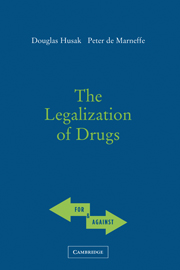7 - Drug Prohibition and Liberalism
Published online by Cambridge University Press: 05 June 2012
Summary
Is Prohibition Objectionably Moralistic?
A common objection to drug prohibition is that it is “moralistic.” This is to say that drug prohibition imposes a moral belief that some hold on others who do not hold it, and the content of this belief is that drug use is morally wrong even if it does not put anyone at serious risk of personal injury. Some may believe that drug use is morally wrong in this way because it involves the mistreatment of one's mind – as nonprocreative sex might be thought to involve the mistreatment of one's sexual organs – and they may support drug laws for this reason. If this were the only reason for drug prohibition, I think this policy would be completely unjustifiable.
The argument that I have just offered for heroin prohibition is not moralistic in this sense. It does not assume that drug use is wrong or bad per se. It assumes that using drugs is the wrong thing for some people to do because their drug use is irresponsible or imprudent, and that their drug use is irresponsible or imprudent because it has bad consequences and not because it is intrinsically wrong. Nor does my argument assume that drug use is irresponsible or imprudent for everyone. I believe to the contrary that, in most instances, drug use is a perfectly defensible form of enjoyment, and nothing I have said so far should be taken to be inconsistent with this belief.
- Type
- Chapter
- Information
- The Legalization of Drugs , pp. 132 - 170Publisher: Cambridge University PressPrint publication year: 2005



